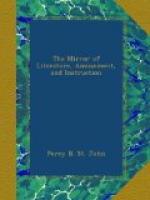Where the pale stranger dares not come,
Proud o’er my native
sands I rove;
An Arab tent my only home,
An Arab maid my only love.
Here freedom dwells without a fear—
Coy to the world, she loves
the wild;
Whoever brings a fetter here,
To chain the desert’s
fiery child.
What though the Frank may name with scorn,
Our barren clime, our realm
of sand,
There were our thousand fathers born—
Oh, who would scorn his father’s
land?
It is not sands that form a waste,
Nor laughing fields a happy
clime;
The spot, the most by Freedom graced,
Is where a man feels most
sublime!
“Away, away, my barb and I.”
As free as wave as fleet as
wind,
We sweep the sands of Araby,
And leave a world of slaves
behind!
* * * * *
NOSTALGIA—MALADIE DE PAYS—CALENTURE.
(For the Mirror.)
This disease, according to Dr. Darwin, is an unconquerable desire of returning to one’s native country, frequent in long voyages, in which the patients become so insane, as to throw themselves into the sea, mistaking it for green fields or meadows:—
“So, by a calenture misled,
The mariner with rapture sees,
On the smooth ocean’s azure bed,
Enamell’d fields and
verdant trees.
With eager haste he longs to rove
In that fantastic scene, and
thinks
It must be some enchanting grove,
And in he leaps, and down
he sinks.”
SWIFT.
The Swiss are said to be particularly liable to this disease, and when taken into foreign service, frequently to desert from this cause, and especially after hearing or singing a particular tune, which was used in their village dances, in their native country, on which account the playing or singing this tune was forbidden by the punishment of death.
“Dear is that shed, to which his
soul conforms,
And dear that hill, which lifts him to
the storms.”
GOLDSMITH.
Rousseau says, “The celebrated Swiss tune, called the Rans des Vaches, is an air, so dear to the Swiss, that it was forbidden under the pain of death to play it to the troops, as it immediately drew tears from them, and made those who heard it desert, or die of what is called la maladie de pays, so ardent a desire did it excite to return to their native country. It is in vain to seek in this air for energetic accents capable of producing such astonishing effects, for which strangers are unable to account from the music, which is in itself uncouth and wild. But it is from habit, recollections, and a thousand circumstances retraced in this tune by those natives who hear it, and reminding them of their country, former pleasures of their youth, and all those ways of living, which occasion a bitter reflection at having lost them. Music, then, does not affect them as music, but as a reminiscence. This air, though always the same, no longer produces the same effects at present as it did upon the Swiss formerly; for having lost their taste for their first simplicity, they no longer regret its loss when reminded of it. So true it is, that we must not seek in physical causes the great effects of sound upon the human heart.”




